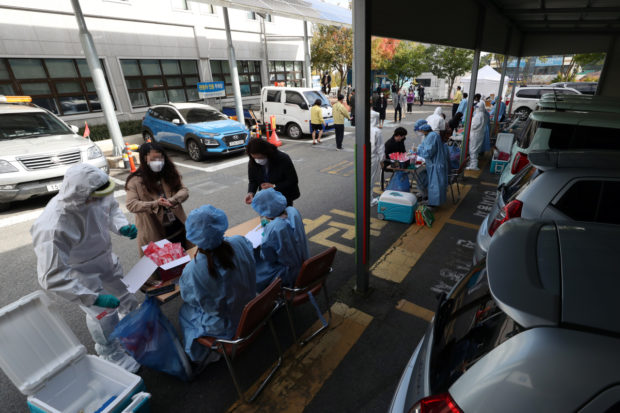SEOUL — South Korea’s health authorities on Tuesday urged members of the public to refrain from attending social gatherings to survive the coronavirus winter without an available vaccine, amid rising cases linked to in-person gatherings and increased autumn activities.
Korea reported 88 new coronavirus cases –72 cases locally transmitted and 16 imported from overseas — in the 24 hours ending Monday at midnight, according to the Korea Disease Control and Prevention Agency.
“Ahead of a full-blown winter, the coronavirus situation here is being contained and controlled at a steady level. But there is always a possibility of the exponential surge in virus cases,” KDCA Deputy Director Kwon Jun-wook said at a briefing.
Winter creates a favorable environment for the coronavirus to spread, with low temperatures, increased indoor activities in enclosed spaces, other infectious disease outbreaks and surging cases abroad, he pointed out.
“This winter may be the second and the last winter where we should overcome COVID-19 with only social distancing measures before a COVID-19 vaccine becomes available sometime next year,” he said.
Authorities are particularly concerned because about 80 percent of the virus cases are being reported in the Greater Seoul area, home to nearly half of the country’s population.
“It is my honest opinion that we should refrain from having gatherings as much as possible this winter,” he said, referring to the silent spread of the coronavirus in the local community, which leads to outbreaks at hospitals and nursing facilities.
The daily case count has fluctuated around 100 for the past two weeks since the country eased antivirus restrictions. The tally climbed to 155 on Friday, the highest single-day rise since Sept. 17, fell below 100 over the weekend and shot up to 119 on Monday.
The proportion of cases whose transmission routes were unknown was 11.4 percent for the past two weeks, according to the KDCA.
A new cluster of infections was detected from a golf gathering among friends. Since the first case was reported Thursday, 30 more people have tested positive for the virus as of Tuesday after playing golf and having a meal together in Yongin, Gyeonggi Province, on Oct. 17.
In connection with a family gathering in southwestern Seoul, 13 more people tested positive for the virus, bringing the total related cases to 14. The first case was reported Thursday.
Additional cases are being reported from other existing clusters of infections including nursing homes, a rehabilitation hospital, a welfare facility and a swimming pool.
Of Tuesday’s locally transmitted cases, the majority were in Greater Seoul — 24 in Seoul, 27 in Gyeonggi Province, which surrounds the capital, and two in Incheon. Six cases were posted in Gangwon Province, with five each in South Gyeongsang Province and Daejeon, two each in Incheon and South Jeolla Province and one in North Chungcheong Province.
Korea reported 16 imported cases. Of them, 11 were identified while the individuals were under mandatory self-quarantine in Korea, with the other five detected during the screening process at the border. Three cases were from elsewhere in Asia, while six were from Europe and seven were the United States. Of the 16 cases, 10 involved foreign nationals.
The number of COVID-19 patients in serious or critical condition here was 52 as of Tuesday.
Three more people died from the virus, with bringing the death toll to 460. The overall fatality rate is now 1.77 percent.
So far, of the 26,043 people confirmed to have contracted the new coronavirus here, 23,981 have been released from quarantine upon making full recoveries, up 76 from a day earlier. Some 1,602 people are receiving medical treatment under quarantine.
The country carried out 15,323 tests in the past day, with over 2.56 million tests conducted since Jan. 3. Some 23,003 people were awaiting results as of Tuesday.
